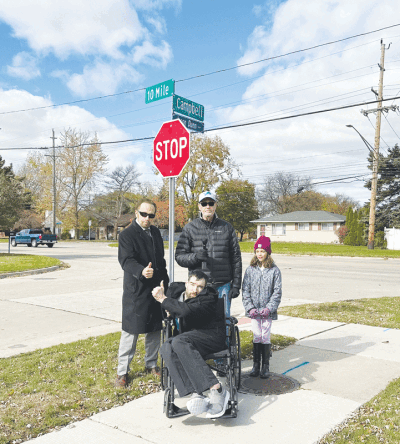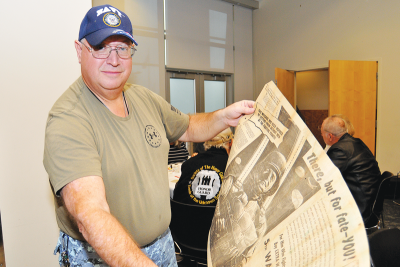
Former Warren Mayor James Fouts dedicated a street in honor of Jason Dunn, center, photographed with dystonia awareness advocate Mike Delise and his 8-year-old granddaughter, Sylvia Spadafore.
Photo provided by the Warren mayor’s office
WARREN — Before leaving office as Warren’s mayor, James Fouts renamed a street in honor of a longtime Warren resident who advocates for dystonia awareness and supports efforts to find a cure.
Jason Dunn has dystonia, a chronic movement disorder affecting the brain and nervous system, for which, according to doctors, there is currently no cure. Dystonia causes excessive, uncontrollable muscle spasms that twist the body and limbs into involuntary movements and contorted postures.
“Jason Dunn Way” now runs along a stretch of Campbell Avenue at 10 Mile Road.
“Jason has been an inspiration to me and to many people who may not be suffering from dystonia, but many other people who have an unusual disease in which there is little notification by the media and little understanding. They’re kind of alone in this battle,” Fouts said. “If I can help him in whatever way, I have. A final good tribute, which was lobbied to me by Mike Delise, would be to have a street named after Jason.”
Delise and Dunn work in tandem to shed light on dystonia, which affects 250,000 in the United States and millions around the world. It is the third most common movement disorder behind essential tremor disorder and Parkinson’s disease.
“Very few people know about dystonia. It is a muscle wasting disease, a very challenging disease,” Fouts said. “It is something we need to put more money and effort into and hopefully in Jason’s lifetime we’ll be able to find a cure. And not only can we celebrate the street being named after him, but we can celebrate a cure for Jason and many others with this disease or something of this nature.”
Delise met Dunn more than 20 years ago, when Dunn was a high school classmate of Delise’s daughters and attended one of their graduation parties.
“I couldn’t believe that I never heard the word dystonia in the condition that he’s in,” said Delise. “He was pretty twisted up. He was better back then.”
When the two met, Delise said Dunn could speak and be understood. Dunn has lost the ability to speak and uses a Lightwriter, which is a text-to-speech device where typed words are transmitted audibly.
“He actually seems like he has gotten a little worse. He has had five brain operations, DBS (deep brain stimulation) and all that stuff, to see if it would help, but it hasn’t,” Delise said.
Delise liked Dunn’s magnetic personality.
“He is a very witty guy. Got a great attitude. I think that’s what really inspired me was his attitude,” said Delise. “Always had a smile on his face. That’s probably what got me wanting to help him.”
In 2007, according to Delise, Dunn’s house was falling apart, and he was living on his own. It was then they started to bring awareness to dystonia. They could not get any help until Delise contacted the now-former mayor.
“I met Jason several years ago in my first term as mayor,” Fouts said. “We were able to get a new home built for him that would accommodate his needs through Habitat for Humanity.
“I have been happy working with Jason Dunn. Mike Delise, who has been an inspiration in helping Jason, I really want to commend him. He has done a good job,” said Fouts.
According to Delise, they received donations to tear down the old house, materials for the new house, as well as a $20,000 donation from the Warren Lions Club and a $20,000 matching donation from Habitat for Humanity. Delise and Dunn teamed up and raised the balance of the $100,000 cost of the house.
“We built the house right on the same lot that he grew up on,” Delise said. “So it’s basically like he has been in that house his whole life.”
The two continued to spread awareness about dystonia.
“We’ve been all over,” Delise said. “My job was to always try to make connections for him.”
Dunn is a sports lover and Delise took him to Lions, Tigers, Pistons, Red Wings and Michigan games and practices. Delise also got Dunn involved with other activities he enjoys, including bowling.
“I was always trying to get somebody who could take my place, who could do more for him than I thought that I could, but we’ve never been able to make that connection, so I’ve just continued on. And here we are,” said Delise.
According to Fouts, Delise has been a mentor and an advocate for Dunn.
Dystonia can attack at any time, according to Delise.
“Anyone can get dystonia, at any age, regardless of ethnicity or gender,” said Delise.
Dunn has generalized dystonia, which affects the entire body. He has had dystonia since he was 6 years old and is now 43, said Delise. In Dunn’s case, doctors do not know what caused it, Delise said.
“Hope is good. Hope is great. We can hope for a cure. But we all know that the only way you’re going to find a cure is through research and research takes money,” said Delise.
Delise encouraged giving to dystonia-foundation.org whether it is $5, $10 or whatever someone can give.
 Publication select ▼
Publication select ▼






















